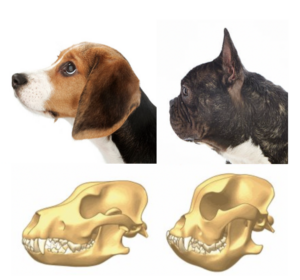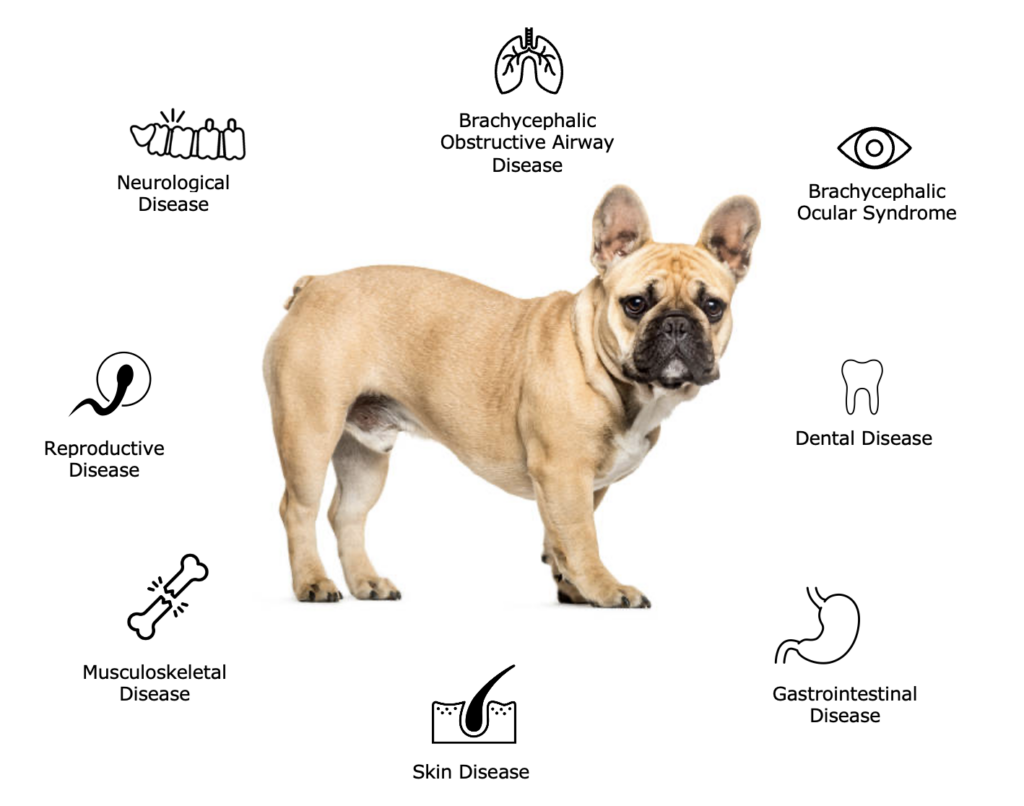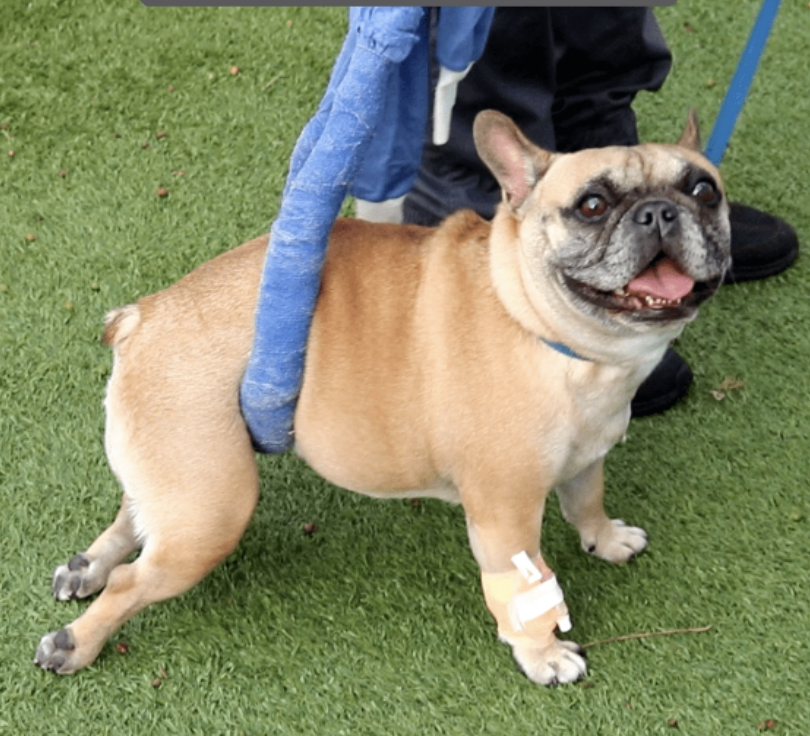This article focuses on the most common french bulldog health issues.

As discussed in our previous articles on Brachycephalic Obstructive Airway Syndrome, dog breeds that have “flat faces” such as the French Bulldog, Pug and English Bulldog, are classified as “brachycephalic”.1 This means that they have a short, wide skull in comparison to other dog breeds.1

Unfortunately, selective breeding for these extreme physical features has resulted in a plethora of health problems for these dogs, which we will expand upon below, specifically focusing on French Bulldog health issues.
Most Common French Bulldog Health Issues

Breathing Issues (Respiratory Disease)
Due to their abnormal, shortened skulls, brachycephalic dogs have an excess of soft tissue in their upper airway, which reduces their ability to breathe normally. They can also have an abnormally small or narrowed windpipe, termed a “hypoplastic trachea”, which further reduces their ability to get air down into their lungs.1
These features are part of a condition called Brachycephalic Obstructive Airway Syndrome (BOAS), which means that they have abnormal airways which reduces their ability to breathe normally. In severe cases BOAS can even result in death due to complete obstruction of the airway or through secondary complications such as aspiration pneumonia.1 Unfortunately, this is one of the most common french bulldog health issues.
Symptoms of BOAS include snoring, snorting, noisy breathing, exercise and heat intolerance.1 These symptoms are so common among brachycephalic breeds such as French Bulldogs that they are incorrectly considered “normal for the breed” by many.2
If your dog is exhibiting signs of breathing problems, you will find these guides useful:
GI Issues (Gastrointestinal Disease)
There are several gastrointestinal disorders that have been recognized in brachycephalic dogs, such as gastro-esophageal reflux (also known as GORD or heartburn in people), esophagitis/gastritis and hiatal hernias (when a portion of the stomach inappropriately moves into the chest cavity).1 These gastrointestinal disorders are linked to their respiratory disease.3
Brachycephalic Obstructive Airway Syndrome results in chronic increased negative airway pressure, as these dogs must increase their breathing (inspiratory) effort to suck air past their obstructed upper airways.3
You can think about this as creating a vacuum effect, which “sucks’ ‘ the contents of the stomach up into the esophagus, which is gastro-intestinal reflux. Chronic gastro-intestinal tract upset is uncomfortable and presents with symptoms of nausea (turning their nose up at food, licking lips), flatulence and reflux (bringing up white frothy foam).1,3
Musculoskeletal Issues
French Bulldogs have an increased prevalence of fractures of the upper arm near the elbow (humeral condylar fractures).4 They have also been found to be at an increased risk of dislocating their knee caps (patellar luxation).9 Additionally, hip dysplasia is also observed at a high rate in brachycephalic breeds.6
Neurological Issues
As an additional consequence of an abnormally shortened and widened skull, brachycephalic breeds are predisposed to neurological conditions such as excess cerebrospinal fluid on the brain (hydrocephalus) and a condition where the skull is too small for the size of the brain (Chiari-like malformation).6
Another abnormal feature of these breeds includes vertebral abnormalities and malformations such as hemivertebrae, which can predispose to other spinal disease processes such as intervertebral disc disease (IVDD).
Intervertebral disc disease, also known as a “slipped disc” or “herniated disc” can result in permanent paralysis in severe cases. French Bulldogs with IVDD are particularly prone to recurrence, with up to 50% of Frenchies that had previously experienced a slipped disc going on to develop another slipped disc.8 This is unfortunately another very common French Bulldog health issue that owners should be aware of.
Reproductive Issues
Brachycephalic breeds are predisposed to reproductive problems such as difficult or obstructed labor (dystocia). Brachycephalic puppies have large, wide heads, which when combined with the narrow pelvis of the brachycephalic bitch, results in an inability to give birth naturally.
One European study found that 94.8% of English Bulldogs are delivered via Caesarean section.10 Another UK study found that French Bulldogs were 15.1 times more likely to have difficulty giving birth than other crossbreeds. 11
Eye Issues (Ocular Disease)
The abnormal skull shape of brachycephalic breeds has also predisposed them to eye (ocular) disease, which is termed “Brachycephalic Ocular Syndrome (BOS)”.12 Their compressed skulls have resulted in shallow eye sockets and they also commonly have abnormal eyelid development.
Additionally, brachycephalic breeds have also been found to have less tear production than other breeds. These factors predispose brachycephalic dogs to corneal ulcers, which is damage to the cornea (the outer, clear layer of the eyeball). Corneal ulcers are painful and in severe cases may result in the patient needing to have their eye removed surgically.12
Skin and Ear Issues (Dermatological Disease)
Dermatological (skin & ear) disease is commonly seen in brachycephalic breeds. They are predisposed to environmental or food allergies) (atopic dermatitis) and skin fold dermatitis (e.g. facial fold or tail fold dermatitis). As well as skin disease, brachycephalic breeds are also over-represented for outer ear infections, which can progress to middle and inner ear infections.13
Dental Issues
Finally, due to their abnormally shortened skulls, brachycephalic breeds are predisposed to malocclusions, which is when the teeth do not line up appropriately. This can cause pain as the teeth may then be pressing into the soft tissues of the mouth or other teeth. Additionally, crowing and rotation of teeth predisposes to periodontal disease.15,16
Welfare Concerns for French Bulldog Health Issues
Given the number of diseases that are associated with brachycephalic breeds, there is no wonder why the explosion in popularity of French Bulldogs has been considered an animal welfare crisis. Dogs that suffer from Brachycephalic Obstructive Airway Syndrome (BOAS) that may be considered clinically normal have been shown to have chronically low blood oxygen levels (hypoxia).3
BOAS is also associated with sleep apnea, with many photos of Frenchies sleeping while sitting up or with a toy in their mouth going viral as “cute” and “funny”, when in fact these dogs are trying to keep their airway open whilst they sleep. These dogs are often chronically tired (which may be mistaken as being “lazy”) as they wake several times through the evening and will often be seen falling asleep whilst sitting or standing.3

Many veterinary professionals have reported that brachycephalic breeds, when undergoing anesthetic, will commonly tolerate their breathing tube much longer than other breeds. A breathing tube is a plastic tube that is placed down the airway while under anesthesia to keep it open and allow delivery of oxygen and anesthetic gasses.
When dogs begin to wake from the anesthesia, they dislike the feeling of the breathing tube and it is gently removed. However in brachycephalic dogs, they will commonly tolerate this tube until they are completely awake, as this is likely the best they have ever been able to breathe.

While BOAS surgery is an option for these dogs, BOAS is a progressive disease, meaning that it will generally worsen over time.1 Surgery aims to slow the progression of secondary changes associated with the disease such as laryngeal collapse, but it is not a permanent or complete fix for these dogs.
In addition to their breathing issues, intervertebral disc disease (IVDD) has become a recurrent issue in French Bulldogs. IVDD can be particularly distressing for owners and the veterinary team, as in severe cases it can be fatal. It is particularly heart-wrenching to see French Bulldogs who have previously undergone spinal surgery and recovered, present to the veterinary hospital with another blown disc, which may occur less than 12 months after the first one.8

Another concern is the evidence that brachycephalic breeds live shorter lives than non-brachycephalic breeds. A recent UK study found that the average life expectancy for a French Bulldog is 4.53 years.17 This is much lower than the commonly cited 10-12 years. Other studies comparing brachycephalic to non-brachycephalic breeds have shown with statistical analysis that flat faced dogs such as the English Bulldog have much lower health, which is driven by their extreme body and facial features.18
Brachycephaly and French Bulldog Health: Owner Perceptions
So with all these French Bulldog health issues, why do people keep buying Frenchies and other brachycephalic breeds? Several studies have demonstrated that owners of brachycephalic breeds do not perceive that their dogs are in ill health.
One such study that surveyed brachycephalic owners found that 20% had undergone at least one corrective surgery and 36.5% of owners reported that their dog had intolerance to heat. However, despite this awareness, 70.9% of owners considered their dog to be “in very good health” or “best health possible”.2
There is clearly a disconnect between the health of flat-faced dogs and owner perception.
Unfortunately, symptoms of disease in these dogs such as snoring, snorting, heat and exercise intolerance are so common that it has become considered “normal for the breed”. It is important for us all to recognize that these symptoms are not normal and reduce the quality of life in these dogs.
Ways to Improve French Bulldog Health Issues
So what are the solutions? There are many opinions on how we should be addressing this animal welfare crisis and there are many different stakeholders involved, including veterinarians, animal welfare groups, breeders and owners.

In Norway, legislation was passed to ban breeding of the English Bulldog, with the court ruling that breeding of these dogs breached the county’s animal welfare laws. While banning brachycephalic breeds would seem to fix this animal welfare issue, there are concerns that this could ultimately lead to owners turning to underground, unregistered breeders. This legislation was reversed at the end of 2022, with the ban on breeding lifted.20

Another approach that has been advocated in many other countries such as the UK, is working towards improving the current breeds by changing breed standards. The University of Cambridge and the Kennel Club have developed a Respiratory Function Grading Scheme, which is a non-invasive test to help determine whether the dog is affected by BOAS.19
This tool is being used across the UK and internationally to help advise owners whether their dog is affected by BOAS and offer guidance to breeders to lower the risk of producing affected puppies (Kennel Club).19 There are several registered breeders who are using this grading scheme as well as other screening tests in an effort to work towards a healthier breed.
The Way Forward: French Bulldog Health Issues
In response to the growing popularity of brachycephalic breeds and the concern for their welfare, the Brachycephalic Working Group (BWG) was formed in 2016. The BWG is a single body comprised of all stakeholders of dog welfare in the UK including vets, breeders, The Kennel Club, animal welfare groups and owners, that aims to improve the welfare of these dogs. The Brachycephalic Working Group encourages all potential dog owners to stop and think before buying a flat faced dog.21
It is encouraging that there has been more concern and awareness for brachycephalic breeds in recent years. There are a tremendous number of campaigns, such as the “Love is Blind” campaign in Australia, that aim to increase public awareness of the issue. It is clear that education is key and all stakeholders (owners, vets, animal welfare groups, breeders) must work together to improve the welfare of these animals.
If you are a new French Bulldog owner or perhaps have had a Frenchie for a while but haven’t come across this information previously, we understand that reading about all these health and welfare concerns can be overwhelming and upsetting.
We encourage you to be an advocate for your pet and to reach out to your veterinarian to discuss how you can work together to provide the best care possible for your family member. We also encourage you to share your new knowledge with your friends, family and other dog owners.
There are several resources available for further information which we have compiled below:
- Health & Welfare of Brachycephalic (Flat-faced) Companion Animals: A Complete Guide for Veterinary and Animal Professionals – A book written for owners, breeders and veterinarians that examines all perspectives of the brachycephalic dog welfare crisis.
- Love Is Blind – A joint campaign of the Australian Veterinary Association and the RSPCA
- #BreedToBreathe – A campaign of the British Veterinary Association
- Brachycephalic Working Group
- Cambridge BOAS Research Group
*Disclaimer: This article is not individualized for your pet and is not a substitute for professional veterinary advice. Please see your veterinarian for individualized recommendations.
Photo References
- Side view of a Black and White French Bulldog (purebred) stock photo [Internet]. 2016 [cited 2023 May 6]. Available from: https://www.istockphoto.com/photo/side-view-of-a-black-and-white-french-bulldog-gm595758988-102145435
- McConnell F. Radiology: skull and mandible [Internet]. Vetlexicon; [cited 2023 April 29]. Available from: https://www.vetlexicon.com/treat/canis/freeform/radiology-skull-and-mandible
- Model shot of beagle dog, copy space stock photo [Internet]. 2015 [cited 2023 April 29]. Available from: https://www.istockphoto.com/photo/model-shot-of-beagle-dog-copy-space-gm477430742-67119229
- French Bulldog in front of white background. iStock. Published March 25, 2019. Accessed September 7, 2023. https://www.istockphoto.com/photo/french-bulldog-in-front-of-white-background-gm1137944598-303616041
- somegirlfromsask. My frenchie chooses to sleep with a ball in her mouth so the other dog won’t play with it. Published December 28, 2022. Accessed September 7, 2023. https://www.reddit.com/r/aww/comments/zwwp3e/my_frenchie_chooses_to_sleep_with_a_ball_in_her/
- Harrison J. Pedigree Dogs Exposed - The Blog: Pugs: going down the tubes. Pedigree Dogs Exposed - The Blog. Published June 14, 2015. Accessed September 7, 2023. http://pedigreedogsexposed.blogspot.com/2015/06/pugs-going-down-tubes.html
- Perez-Poveda V. Myelomalacia in Dogs. Southeast Veterinary Neurology. Published March 23, 2022. Accessed September 7, 2023. https://sevneurology.com/blog/myelomalacia-in-dogs/
- Why Norway BANS Breeding of English Bulldogs and Cavalier King Charles Spaniels? www.youtube.com. Accessed September 7, 2023. https://www.youtube.com/watch?app=desktop&v=fjgirJSKSas
- “Breed For Health. Not Show”: Breeder Is Reengineering French Bulldogs’ Faces To Make Them Healthier. Bored Panda. https://www.boredpanda.com/french-bulldog-breeder-reingeener-dog-face/?utm_source=google&utm_medium=organic&utm_campaign=organic
